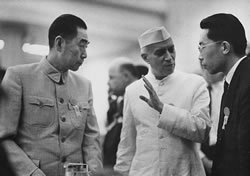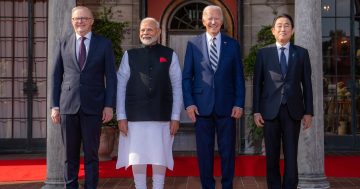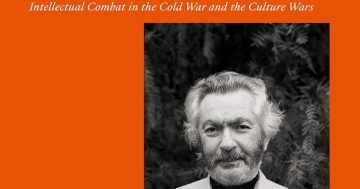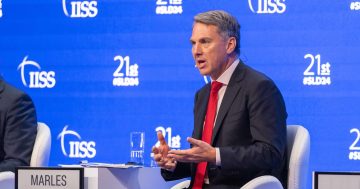Kai He* says that while Beijing does not intend to get involved in an ideological battle with Washington, all of Asia risks getting caught up in their strategic competition.
 A new cold war: That’s appearing in headlines throughout Asia amid the deepening strategic enmity between the United States and China.
A new cold war: That’s appearing in headlines throughout Asia amid the deepening strategic enmity between the United States and China.
Since late June, high-ranking officials in Washington have unleashed a series of attacks on the Chinese Communist Party.
National Security Adviser, Robert O’Brien; FBI Director, Christopher Wray; Attorney General, William Barr and Secretary of State, Mike Pompeo have been dubbed the ‘four horsemen of the apocalypse’ tasked by US President, Donald Trump to take down the Communist Party.
Pompeo’s 23 July talk at the Richard Nixon Presidential Library called for a new “alliance of democracies”, evoking former United Kingdom Prime Minister, Winston Churchill’s ‘Iron Curtain’ speech more than 70 years ago.
In his Labour Day remarks, Trump raised the prospect of “decoupling” the American economy from China.
Washington has taken concrete actions such as closing the Chinese Consulate-General in Houston, sending its Health Secretary to Taiwan and restricting Chinese apparel and tech goods allegedly produced by forced labour in Xinjiang.
While the US explicitly targeted the Communist Party and the communist ideology, China has refrained from doing the same towards democracy.
China’s Foreign Minister, Wang Yi has rejected the idea of a new cold war by saying that “today’s China is not the former Soviet Union. We have no intention of becoming another US. China does not export ideology”.
Since August, top diplomats from the US and China have been busy with their respective charm offensives.
While Pompeo worked hard to sell a hard-line policy on China, especially concerning 5G technology and Huawei, in Europe, Wang Yi conducted a diplomatic tour of five European countries.
European nations might be sympathetic to Pompeo’s calls for democracy, and share deep concerns over the human rights issues in China.
However, they have hesitations over blindly following the Trumpian cold-war strategy of decoupling with China – simply because China is their largest trading partner and an indispensable player in the global supply chain.
More importantly, China seems to have no intention of exporting communism to other countries, unlike the Soviet Union during the Cold War.
The upgrading of the Quadrilateral Security Dialogue, the informal strategic forum known as the Quad, between the US, Australia, Japan and India, seems to be an emerging Asian equivalent of the North Atlantic Treaty Organisation.
The recent border stand-off between China and India has pushed New Delhi closer to the other Quad countries.
The further institutionalisation of the Quad vis-à-vis becoming an Asian NATO is to a large extent contingent on how Beijing handles this dispute.
The policy-makers in New Delhi and Beijing have tried to keep cool heads, as evinced by the recent joint statement calling for more confidence-building measures after their Foreign Ministers met in Moscow.
An Asian NATO is not impossible, but it is more likely to be driven by China’s ‘Wolf Warrior’ diplomacy than the American democracy-based ideological appeal.
It sounds like a cliché to say that other countries in Asia do not want to pick sides. It would surely be nice to bet on both sides.
However, the wait-and-see or hedging approach adopted by most Asian countries against the backdrop of intensifying US-China strategic competition will not be good enough to prevent a new cold war.
It is passive and even dangerous because both Washington and Beijing may be encouraged to take a risk-acceptant move, even up to a small-scale confrontation, to lure these important players into their respective camps.
Therefore, the indifferent attitude of other Asian countries might accelerate, rather than circumvent, a new cold war between the US and China in Asia.
It is time for Asian countries to revisit the ‘Bandung Spirit’ that inspired the Non-Aligned Movement during the US-Soviet stand-off.
It is imperative for other countries to proclaim clearly that it is not in anyone’s interest to have a new, ideology-driven cold war.
China and India were among the participants of the 1955 Bandung Conference in Indonesia.
It is their responsibility to reignite the Bandung Spirit and resolve their border disputes peacefully.
A new cold war might serve some politicians’ personal interests in the short run, but it will lead to a political, social and economic catastrophe in the region for decades.
It should not be forgotten that Bandung was about peaceful coexistence among nations.
The thought that ‘the end of history’ can be brought about with an ideological victory for one or the other is a dangerous delusion.
*Kai He is Professor of International Relations at the Griffith Asia Institute and Centre for Governance and Public Policy, Griffith University.
This article first appeared on the South China Morning Post website.








